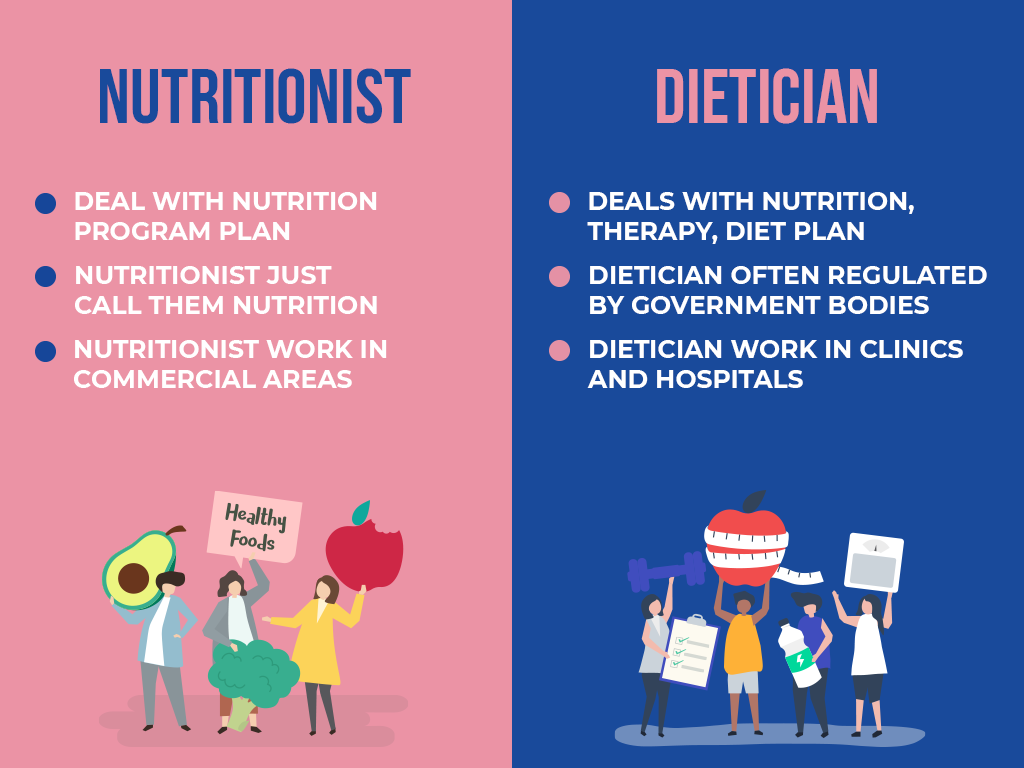All Categories
Featured
Table of Contents
-1
And if you would certainly like to enter the food and nutrition industry, it's worth understanding what those distinctions are currently. This quick breakdown must provide you a great idea. Dietitians aid their customers browse the link in between food and health and wellness. They do this by equating the current clinical and clinical study into useful suggestions that people can use to their lives.
-1Nutritional experts typically work in group settings, educating bigger neighborhoods and organisations. They can additionally operate in various other areas such as: Testimonial policies and laws around foods, consisting of top quality checks. Guarantee that food is produced to fulfill food safety and security criteria. Develop programs and treatments to help the larger public address food issues.
-1The primary difference to understand is that the nourishment occupation isn't regulated in Australia. This means that technically, any person can call themselves a 'nutritionist', while you need to have an approved dietetics certification to be a dietitian. To protect properly practising nutritionists, the Nutrition Society of Australia has a Register of Nutritionists.
-1The ordinary salary for a nutritional expert is $75,000 per year. This can vary from $60,000 to $90,000, depending on the duty.
Bariatric Nutritionist
-1Keen to function with customers on their dietary goals faster instead of later? Study a level in nutrition. Intend to take your know-how also better, and help treat diet-related clinical problems? A job as a dietitian might be best for you. In either task, you will play a crucial duty aiding individuals make the very best choices for their diet plan and health.

-1
Dietitian and nutritionist: both of these careers function around diet and food, yet are they the same? While they overlap in some methods, these jobs are in fact fairly different. What precisely is the distinction in between a dietitian and a nutritional expert? The brief solution is that a dietitian operates in a controlled area, and have to have finished a bachelor's degree.
-1Despite the differences in certifications between a dietitian versus nutritional expert, the salaries are fairly comparable. While there is a higher need for qualified dietitians, nutritionists tend to have greater job complete satisfaction - Registered Dietitian.
Personal Trainer And Nutritionist – Cambridge
-1You can operate in a huge series of markets for a large range of organisations or even on your own. If you're still not sure regarding whether to come to be a dietitian versus a nutritionist, the adhering to may help you make a decision. As a dietitian, you might appreciate a career as a: a signed up dietitian or dietitian nutritionist is a person who works in the general area of dietetics, suggesting diets, supplements and nutritional aids to support healthy way of livings and disease administration.
-1To become country wide approved, dietiticians need to sign up with the Accredited Practising Dietitian (APD) program and come to be a participant of Dietitians Australia. Whether dietitian or nutritionist is a much better occupation for you far better depends on your personal preferences. It is essential to keep in mind that all dietitians are nutritionists, yet not all nutritionists are dietitians.
Renal Dietitian
-1Both professions are involved with assisting individuals achieve their wellness objectives through food education and learning, yet there are many factors that establish them apart. If you have an interest in suggesting individuals on dietary and nutritional issues, you might have what it takes to end up being a nutritionist or diet professional. The area of food scientific research is unbelievably wide, offering a variety of career chances to qualified professionals.
-1Nutritional experts are experts in supplying evidence-based recommendations and services associated with nourishment. Through routine appointments, nutritionists help customers recognize the web link in between diet plan and health and wellness so they can make even more enlightened choices around food and live a much healthier lifestyle. Nutritional experts usually collaborate with customers on an individual basis, although they also work with groups with a particular aim (e.g.
Weight Management Nutritionist
-1Even though you don't need to examine to come to be a nutritional expert, doing so could enhance your possibilities of advancing your profession in this area. Courses that have a specialized in Nutrition, like the HLT43015 Certificate IV in Allied Health Support (Nutrition and Dietetics Specialisation), are designed to develop your understanding of the relationship between food and health, permitting you to supply professional advice on nutrition.
Child Nutrition Guidance
-1Jul 09, 2018 Australia currently does not control the expert titles 'nutritional expert' or 'dietitian', leaving a broad market for false information if you do refrain your very own research. The media additionally has a tendency to make use of both terms mutually, making distinctions between credentials progressively hard. Check out on as we break down the differences in between these occupations, their relevant certifications, what they can do for you and what to search for when seeking a specialist to assist you.
-1So you have made a decision that you require to boost your wellness which servicing your diet plan is the most effective location to begin. You have found out about the benefits of collaborating with a dietitian or a nutritional expert, however you aren't sure which you need or just how to choose that to collaborate with.

-1
Nevertheless, the major distinctions are the kind of research that has actually been finished by each professional, and the guidelines connected to each title. A dietitian has actually satisfied the nationwide and worldwide criteria for specialist regulation. Dietitians are the only nourishment specialists to be regulated by regulation, and they are regulated by a moral code (much like medical professionals are) to guarantee that they always function to the highest requirement.
-1On the other hand, someone who has the title of a nutritionist is not secured by legislation in several countries, and it is not a controlled term. All dietitians are thought about to be nutritionists; nonetheless, nutritionists without a dietetics certification can not take on the specialised function of a dietitian. For someone to end up being a signed up dietitian, they need to have completed a 4 year college degree in Nutrition and Dietetics, or a 3-year science level complied with by a Masters Degree in Nourishment.
Certified Sports Nutritionist – West Leederville

-1
Since all of this details has been provided, we can reroute our focus to the opposite end of this dietician vs nutritional expert discussion. On a holistic level when going over 'what is the distinction in between a diet professional and a nutritionist?', we can state the functions don't vary hugely. Dietitians will still organise food and nutrition plans, in order to advertise a healthy and balanced way of life among their customers.
-1Diet professionals can also function in academic facilities such as Colleges. In comparison to this, the largest distinction in between a nutritional expert and dietitians in the UK is that nutritionists to function in clinical sectors. Local Dietitian. Rather, they can function within the health and wellness industry in functions such as dietary experts in food circulation firms, along with a personal trainer who gives recommendations and recommendations to their customers
-1This brings us on discussing the next difference in between a diet professional and nutritional expert in the UK. You may have read this heading and questioned 'is there a distinction between a dietician and a nutritional experts' clients?'. It's only natural to presume that anybody seeing either professional will certainly be doing so for similar reasons, but this is not the situation.
Table of Contents
Latest Posts
Eating Disorder Management
Eating Disorders - Perth
Food Allergies
More
Latest Posts
Eating Disorder Management
Eating Disorders - Perth
Food Allergies